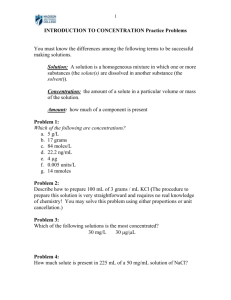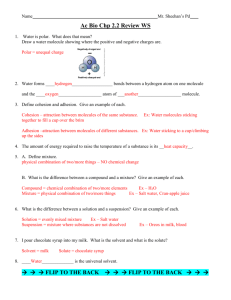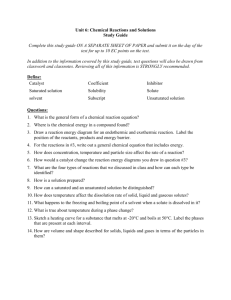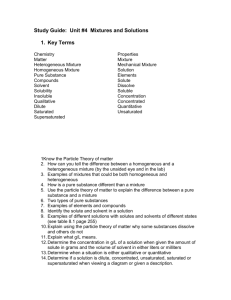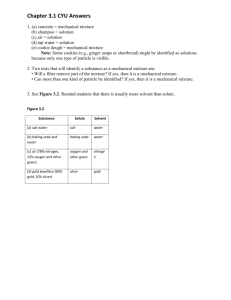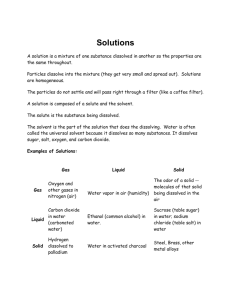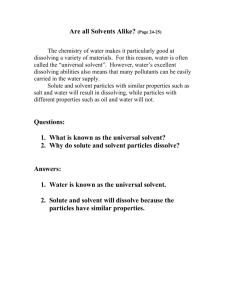1st Semester Exam STUDY GUIDE
advertisement
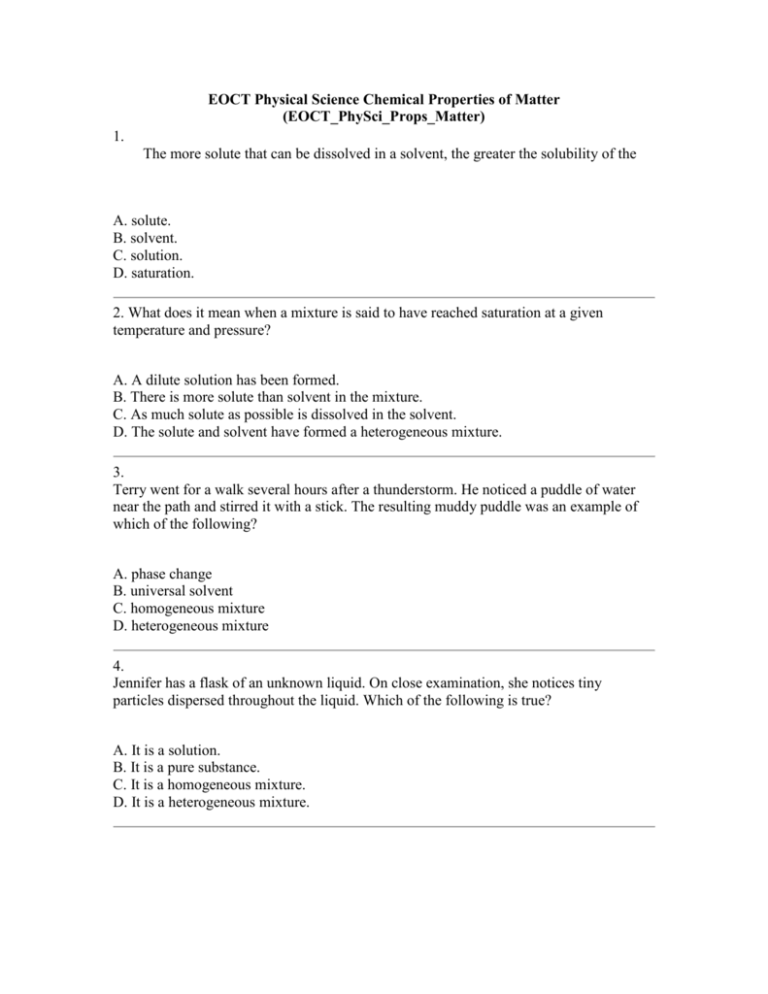
EOCT Physical Science Chemical Properties of Matter (EOCT_PhySci_Props_Matter) 1. The more solute that can be dissolved in a solvent, the greater the solubility of the A. solute. B. solvent. C. solution. D. saturation. 2. What does it mean when a mixture is said to have reached saturation at a given temperature and pressure? A. A dilute solution has been formed. B. There is more solute than solvent in the mixture. C. As much solute as possible is dissolved in the solvent. D. The solute and solvent have formed a heterogeneous mixture. 3. Terry went for a walk several hours after a thunderstorm. He noticed a puddle of water near the path and stirred it with a stick. The resulting muddy puddle was an example of which of the following? A. phase change B. universal solvent C. homogeneous mixture D. heterogeneous mixture 4. Jennifer has a flask of an unknown liquid. On close examination, she notices tiny particles dispersed throughout the liquid. Which of the following is true? A. It is a solution. B. It is a pure substance. C. It is a homogeneous mixture. D. It is a heterogeneous mixture. 5. Vinegar is a liquid solution containing acetic acid and water. It could be accurately classified as which of the following? A. a colloid B. a compound C. a homogeneous mixture D. a heterogeneous mixture 6. Which process is represented by the following description: "sugar is added to water and a sweet liquid results after stirring"? A. melting B. dissolving C. evaporation D. oxidation 7. What is the correct formula for the compound formed when lithium and oxygen combine? A. B. C. D. 8. The water from hot springs near the Ebeko volcano in the Pacific Ocean has a very low pH. A low pH indicates which of the following about the water? A. It has no detectable H_ or OH_ ions. B. It has equal concentrations of H_ and OH_ ions. C. It has high concentrations of H_ ions. D. It has equal numbers of positive and negative ions. This online assessment item contains material that has been released to the public by the Massachusetts Department of Education. 9. The table below shows the pH values of samples of substances. According to the table, which of these substances is basic? A. rainwater B. drain cleaner C. distilled water D. soda water This online assessment item contains material that has been released to the public by the Massachusetts Department of Education. 10. Many laboratory preparations of solutions call for stirring the solvent while adding the solute. Which of the following is always an effect of this procedure? A. It decreases the reactivity of the solute. B. It decreases the solubility of the solute. C. It brings the solute and solvent rapidly into contact. D. It produces a double displacement reaction. This online assessment item contains material that has been released to the public by the Massachusetts Department of Education. 11. The correct name for an aqueous solution of HCl is A. chloric acid. B. chlorous acid. C. hydrochloric acid. D. hydrogen chloride. This online assessment item contains material that has been released to the public by the Massachusetts Department of Education. 12. A student pours mineral salts into a bottle of cold water. Which of the following best explains why shaking the bottle will affect the dissolving rate of the salt? A. Shaking exposes the salts to the solvent more quickly. B. Shaking helps more water to evaporate. C. Shaking causes more ions to precipitate out of solution. D. Shaking equalizes the water temperature. This online assessment item contains material that has been released to the public by the Massachusetts Department of Education. 13. The diagram below represents a sodium ion surrounded by several water molecules. This diagram can be used to represent which of the following? A. how sodium ions dissolve in water B. how sodium is neutralized by water C. how sodium metal makes bubbles in water D. how sodium ions precipitate out as a solid in aqueous solution This online assessment item contains material that has been released to the public by the Massachusetts Department of Education. 14. An unbalanced chemical equation is shown below. What are the coefficients of the balanced equation? A. 2:1:3 B. 2:2:3 C. 3:1:2 D. 3:2:2 This online assessment item contains material that has been released to the public by the Massachusetts Department of Education. 15. Concrete is composed of Portland cement, rocks, sand, and water. Which of the following best describes concrete? A. an element B. a compound C. a homogenous mixture D. a heterogeneous mixture This online assessment item contains material that has been released to the public by the Massachusetts Department of Education. 16. Which of the following substances has the highest concentration of hydrogen ions in solution? A. bleach – pH 13 B. water – pH 7 C. tomato juice – pH 4 D. vinegar – pH 3 This online assessment item contains material that has been released to the public by the Massachusetts Department of Education. 17. Three 10 g samples of sugar are represented below. Sample A dissolves in water more slowly than sample B. Sample B dissolves more slowly than sample C. Which of the following best explains why sample A dissolves most slowly? A. It has the most volume. B. It has the smallest surface area. C. It has the largest number of sugar molecules. D. It has the fewest bonds between sugar molecules. This online assessment item contains material that has been released to the public by the Massachusetts Department of Education. 18. Oxygen (O) atoms have six valence electrons and beryllium (Be) atoms have two valence electrons. Which of the following is the correct formula for a compound made of oxygen and beryllium? A. BeO B. BeO2 C. BeO2 D. BeO26 This online assessment item contains material that has been released to the public by the Massachusetts Department of Education. 19. During a physical science activity you are required to make a saturated solution of sodium sulfate (Na2SO4) in water. At what temperature are you most likely to make such a solution? A. 0oC B. 40oC C. 125oC D. 200oC 20. During science lab, several students discovered that iodine dissolved readily in ethanol. In this case, the ethanol would be classified as the A. alloy. B. solute. C. solution. D. solvent. 21. You are given 100 ml of 20oC water at standard atmospheric pressure containing 0.16 grams of carbon dioxide gas. What should you do to INCREASE the amount of carbon dioxide dissolved in this solution? A. Decrease the temperature. B. Increase the temperature. C. Decrease the pressure. D. Stir the solution. 22. When making a solution of sugar and water, you begin with a 500 ml beaker, 10 grams of sugar, and 400 ml of distilled water. Which procedure will allow you to dissolve the MOST sugar in the LEAST amount of time? A. Pour the sugar and water in the beaker. B. Pour the sugar and water in the beaker and stir. C. Pour the sugar and water in the beaker, stir, and heat over a hot plate. D. Pour the sugar and water in the beaker, stir, and place the beaker in an ice bath. 23. Which of these solutes, when dissolved in water, will ionize and form a solution that conducts electricity? A. O2 B. CH4 C. CaCl2 D. C6H12O6 24. Based on the graph, the solubility of ______________ is LEAST influenced by an increase in temperature. A. Ba(NO3)2 B. NaCl C. Na2HAsO4 D. Na2SO4 25. Certain substances, when dissolved in water, produce ions in solution. Such substances are called A. electrolytes. B. elements. C. molecules. D. nonpolar. 26. Ammonia is a common base used in household cleaners. Which is a characteristic of a base? A. pH < 7 B. pH = 7 C. produces OH- in solution D. turns blue litmus red 27. During science lab, students were asked to test a variety of common household substances and classify them as: acid, base, or neutral. Tests on shampoo produced the following results. felt slippery pH 8.5 turned red litmus blue These results indicate A. shampoo is an acid. B. shampoo is a base. C. shampoo is neutral. D. there is insufficient information to classify shampoo. 28. Based on the graph, which compound is MOST soluble at 35oC? A. Ba(NO3)2 B. NaCl C. Na2HAsO4 D. Na2SO4 29. White gold is actually an alloy of three metals: 85% gold 10% nickel 5% zinc In this case, the solvent would be A. gold. B. nickel. C. water. D. zinc. 30. The correct chemical formula for magnesium fluoride is A. MgF. B. Mg2F. C. MgF2. D. Mg7F2. 31. The correct chemical formula for aluminum (Al+3) plus chlorine (Cl-1) is A. AlCl. B. AlCl3. C. Al3Cl1. D. Al3Cl. 32. The correct name for the binary compound, Na2O, is A. sodium oxide. B. sodium oxygen. C. disodium oxide. D. disodium monoxide. 33. The correct name for the binary compound, MgCl2, is A. magnesium(II) chloride(I). B. magnesium dichloride. C. magnesium chlorine. D. magnesium chloride. 34. What is the correct name for the covalent compound CCl4? A. carbon chloride B. carbon tetrachloride C. monocarbon chloride D. monocarbon tetrachloride 35. During science lab, Mr. Smith's students tested the reactivity of various metals in sulfuric acid. When zinc was added to sulfuric acid, bubbles were produced, a sure sign that a chemical reaction had taken place. Based on the law of conservation of matter, if 30 grams of zinc are added to 45 grams of sulfuric acid to produce just 1 gram of hydrogen gas, how much zinc sulfate would also be produced? The formula for the chemical reaction is as follows: Zn + H2SO4 ZnSO4 + H2 A. 15 grams B. 30 grams C. 45 grams D. 74 grams 36. Which of these equations correctly represents a balanced synthesis reaction? A. Na + Cl NaCl B. 2Na + Cl2 2NaCl C. NaOH + HCl NaCl + HOH D. 2Na + O Na2O 37. Hydrogen peroxide decomposes to form water and oxygen. This reaction is represented by which of these balanced equations? A. H2O2 H2O + 2O B. H2O + O2 H2O2 C. 2H2O2 2H2O + O2 D. 2H2O2 2H2O + 2O 38. In Antoine Lavoisier's classic experiment, mercuric (II) oxide is heated in a sealed container. The solid red powder is changed into silver liquid mercury and oxygen gas. If Lavoisier heated 50 grams of powdered mercuric oxide to produce 46.5 grams of liquid mercury, how much oxygen would be released? A. 3.5 grams B. 16 grams C. 32 grams D. 96.5 grams 39. Name the following compound: N2O5 A. nitrous oxide B. nitrogen oxide C. nitrogen pentoxide D. dinitrogen pentoxide 40. Aluminum oxide decomposes to produce aluminum plus oxygen gas. Identify the balanced equation for this decomposition reaction. A. Al2O3 2Al + 3O B. Al2O3 2Al + 3O2 C. 2Al2O3 4Al + 3O2 D. 4Al + 3O2 2Al2O3 41. The coefficients of the correctly balanced equation for the reaction illustrated above are — A. 1, 1, 1. B. 1, 1, 2. C. 2, 1, 2. D. 2, 2, 1. Permission has been granted for reproduction by the Virginia Department of Education © Virginia Department of Education 42. Soda water is a solution of carbon dioxide in water. This solution is composed of a— A. gaseous solute in a gaseous solvent B. liquid solute in a liquid solvent C. gaseous solute in a liquid solvent D. liquid solute in a gaseous solvent Permission has been granted for reproduction by the Virginia Department of Education © Virginia Department of Education 43. The formula for lithium nitride is — A. B. C. D. Permission has been granted for reproduction by the Virginia Department of Education © Virginia Department of Education 44. Which of the following aqueous solutions will cause litmus paper to turn red? A. NaOH B. NaCl C. HCl D. H2O Permission has been granted for reproduction by the Virginia Department of Education © Virginia Department of Education 45. What type of reaction does this illustration represent? A. Decomposition B. Synthesis C. Single-replacement D. Double-replacement Permission has been granted for reproduction by the Virginia Department of Education © Virginia Department of Education 46. When is heated in a crucible, there is a loss of water. How should a student determine the amount of water lost? A. Subtract the mass of the from the mass of B. Subtract the mass of the C. Add the masses of D. Multiply the masses of from the mass of and and Permission has been granted for reproduction by the Virginia Department of Education © Virginia Department of Education 47. A balanced chemical equation has equal numbers of atoms of each type on both sides of the equation. This illustrates the principle of — A. conservation of energy B. conservation of mass C. action and reaction D. natural selection Permission has been granted for reproduction by the Virginia Department of Education © Virginia Department of Education 48. The appropriate model for a decomposition reaction is — A. B. C. D. Permission has been granted for reproduction by the Virginia Department of Education © Virginia Department of Education 49. What is represented by the pH of a solution? A. Partial pressure of hydrogen ions in the solution B. Electronegativity of dissociated hydrogen ions in the solution C. Concentration of hydrogen ions in the solution D. Temperature of hydrogen ions in the solution Permission has been granted for reproduction by the Virginia Department of Education © Virginia Department of Education 50. The formula for dinitrogen tetroxide is — A. B. C. D. Permission has been granted for reproduction by the Virginia Department of Education © Virginia Department of Education 51. When the above equation is balanced, the coefficient of the hydrochloric acid will be — A. 2. B. 3. C. 4. D. 6. Permission has been granted for reproduction by the Virginia Department of Education © Virginia Department of Education 52. The correct name for — A. phosphorus (V) pentoxide. B. phosphorus oxide. C. phosphorus (II) oxide. D. diphosphorus pentoxide. Permission has been granted for reproduction by the Virginia Department of Education © Virginia Department of Education 53. Which pair of solutions would be acidic if mixed in equal quantities? A. A and B B. B and C C. B and D D. C and D Permission has been granted for reproduction by the Virginia Department of Education © Virginia Department of Education 54. Which of the following is a mixture? A. Carbon B. Glucose C. Distilled water D. Air Permission has been granted for reproduction by the Virginia Department of Education © Virginia Department of Education 55. Which type of reaction is represented here? A. Single replacement B. Double replacement C. Synthesis D. Decomposition Permission has been granted for reproduction by the Virginia Department of Education © Virginia Department of Education 56. The correct formula for copper (I) bromide is — A. B. C. D. Permission has been granted for reproduction by the Virginia Department of Education © Virginia Department of Education Answer Key 1. A) solute. 2. C) As much solute as possible is dissolved in the solvent. 3. D) heterogeneous mixture 4. D) It is a heterogeneous mixture. 5. C) a homogeneous mixture 6. B) dissolving 7. B) 8. C) It has high concentrations of H_ ions. 9. B) drain cleaner 10. C) It brings the solute and solvent rapidly into contact. 11. C) hydrochloric acid. 12. A) Shaking exposes the salts to the solvent more quickly. 13. A) how sodium ions dissolve in water 14. A) 2:1:3 15. D) a heterogeneous mixture 16. D) vinegar – pH 3 17. B) It has the smallest surface area. 18. A) BeO 19. B) 40oC 20. D) solvent. 21. A) Decrease the temperature. 22. C) Pour the sugar and water in the beaker, stir, and heat over a hot plate. 23. C) CaCl2 24. B) NaCl 25. A) electrolytes. 26. C) produces OH- in solution 27. B) shampoo is a base. 28. C) Na2HAsO4 29. A) gold. 30. C) MgF2. 31. B) AlCl3. 32. A) sodium oxide. 33. D) magnesium chloride. 34. B) carbon tetrachloride 35. D) 74 grams 36. B) 2Na + Cl2 2NaCl 37. C) 2H2O2 2H2O + O2 38. A) 3.5 grams 39. D) dinitrogen pentoxide 40. C) 2Al2O3 4Al + 3O2 41. D) 2, 2, 1. 42. C) gaseous solute in a liquid solvent 43. B) 44. C) HCl 45. A) Decomposition 46. A) Subtract the mass of the from the mass of 47. B) conservation of mass 48. A) 49. C) Concentration of hydrogen ions in the solution 50. A) 51. D) 6. 52. D) diphosphorus pentoxide. 53. A) A and B 54. D) Air 55. B) Double replacement 56. A)
